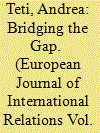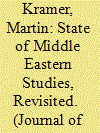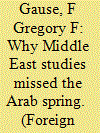|
|
|
Sort Order |
|
|
|
Items / Page
|
|
|
|
|
|
|
| Srl | Item |
| 1 |
ID:
076865


|
|
|
|
|
| Publication |
2007.
|
| Summary/Abstract |
Although International Relations and Middle East Studies share an interest in several aspects of Middle East politics, interdisciplinary research remains surprisingly scarce. This article asks why, despite repeated calls since the inception of these fields, this interdisciplinary gap has never been bridged. It supplements conventional approaches which emphasize a simple intellectual history, with elements of a political economy of the organization and production of knowledge, arguing that while intellectual convergence may be a necessary condition for interdisciplinarity, only a shift in epistemic grounds within which fields understand their scholarship can bring this about, and that this in turn requires a shift in the way knowledge is organized and produced. First, the article provides a genealogy of calls for interdisciplinary scholarship. Second, it locates interdisciplinary relations in the universalist organization of knowledge within which they emerged and which still (re)produce inter- and intra-disciplinary divides today. Finally, it considers the potential for Constructivism to provide an interdisciplinary bridge.
|
|
|
|
|
|
|
|
|
|
|
|
|
|
|
|
| 2 |
ID:
165377


|
|
|
|
|
| Summary/Abstract |
Refugee response planners no longer frame Syrian refugees merely as objects of humanitarian care. Increasingly they are portrayed as enterprising subjects, whose formal integration into labor markets simultaneously can create self-sufficient actors and cure the economic woes of host countries. However, bringing together humanitarian and economic agendas is not an easy task. This article analyzes the contradictions and frictions that have emerged in the process of implementing the Jordan Compact, a political commitment to integrate Syrian refugees into the formal Jordanian labor market, and which is supposed to showcase such win-win strategies. It argues that the Jordan Compact should be seen as a policy model that has achieved enough consensus and incorporated enough disparate objectives to be labelled a ‘policy success.’ Yet, central actors have neglected core features of Jordan’s political economy and labor market, and/or the lives and survival strategies of refugees, such that their radical blueprints of transformation have been disrupted. Despite the widespread commitment to the scheme, it is thus unlikely that the Jordan Compact will both reinvigorate the Jordanian economy and offer Syrians the prospect of a dignified, self-sufficient life, an important lesson for comparable schemes being rolled out across the globe.
|
|
|
|
|
|
|
|
|
|
|
|
|
|
|
|
| 3 |
ID:
154657


|
|
|
|
|
| Summary/Abstract |
Turkey has been absent from the growing literature on the phenomenon of transnational Salafism. A tendency among Middle East specialists to focus on Arab regions and in Turkey on the Islamist movement and its long struggle with the Kemalist establishment has perpetuated the notion of Turkey as a category apart. This article argues that, on the contrary, Salafism is a fringe strand of Turkish Islam that began to evolve in the context of the state's effort in the 1980s to recalibrate religion as a complement to nationalism. Salafism became a topic of discussion in media and scholarly writing in Turkish religious studies faculties, while self-styled Salafi preachers trained in Saudi Arabia found a niche through publishing houses. These publishers facilitated the translation into Turkish of Arabic texts by important Saudi religious scholars in an effort to change the discursive landscape of Islam in Turkey. I show that contra assumptions of a rich Sufi tradition acting as a block against modern Salafi ideas, Salafism managed to gain a foothold in Turkey, facilitated in part by the republic's experience of secular materialism.
|
|
|
|
|
|
|
|
|
|
|
|
|
|
|
|
| 4 |
ID:
191890


|
|
|
|
|
| Summary/Abstract |
This keynote address to the 2022 Association for the Study of the Middle East and Africa (ASMEA) conference assesses the health of Middle Eastern studies in the United States, according to three parameters first defined by ASMEA co-founder Bernard Lewis in 1979: standards, politicization, funding. In all three areas, the field remains plagued by endemic problems.
|
|
|
|
|
|
|
|
|
|
|
|
|
|
|
|
| 5 |
ID:
181050


|
|
|
|
|
| Summary/Abstract |
The libraries at top private and public research universities in the United States hold some of the most comprehensive collections in the world for studying other regions and their modern histories. Yet how this came to be has been largely overlooked. This article unearths the history of the Public Law 480 Program, also known as Food For Peace or PL-480, and how it came to support the large-scale acquisition of Arabic books through a center opened for this purpose in Cairo, Egypt. The article explores the changes in US food exports, specifically wheat, and links these changes to PL-480, US foreign policy, and finally Arabic book acquisitions for US research libraries. By drawing on a variety of publicly available primary sources, as well as a series of interviews with the current and former directors of the Cairo acquisitions center, this article lays out the history of this unorthodox program and its outsized impact on area studies programs in the United States, with a specific focus on Middle East Studies.
|
|
|
|
|
|
|
|
|
|
|
|
|
|
|
|
| 6 |
ID:
104866


|
|
|
|
|
|
|
|